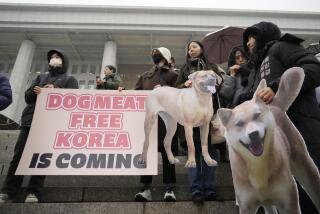Myanmar delays Aung San Suu Kyi verdict
A court’s decision Friday to postpone the much-awaited verdict in a politically sensitive case against opposition leader Aung San Suu Kyi fits into a broader pattern of Myanmar’s military rulers using timing, leverage and blunt force in the interest of political survival, analysts said.
Suu Kyi, 64, faces up to five years in prison on charges of harboring an American who swam across a lake in May and stayed for two days at her home, where she is under house arrest. Foreign governments and human rights groups say the charges are politically motivated. President Obama has called the proceedings a “show trial.”
Lawyers for the 1991 Nobel Peace Prize winner expressed hope that the delay meant the court was carefully considering their arguments. They maintain that Suu Kyi’s government-appointed guards are responsible for security and access to her home, not her, and that the charges are based on laws no longer in effect.
Analysts said the delay probably was part of an effort to keep critics guessing.
“We don’t know what is going to happen next,” said an activist in Myanmar who asked not to be identified because of the risk of reprisal. “But today’s move is a real twist.”
A crowd had gathered Friday outside the courthouse in a Yangon prison, amid heavy state security. Diplomats flew into the country for the verdict. And human rights activists had prepared sound bites for an expected conviction, only to be told to check back Aug. 11.
“They’re very smart,” said David Mathieson, a Thailand-based researcher with Human Rights Watch who covers Myanmar, also known as Burma. “It’s like [the film] ‘Ground Hog Day.’ ”
The intruder, John Yettaw, 53, of Missouri, also is being held. A verdict in his case has been postponed as well.
Delaying the Suu Kyi verdict serves the regime in a couple of ways, analysts said.
It allows authorities to crack down further on domestic opponents and get through a sensitive anniversary, which could bring people into the street. Aug. 8 will be the 21st anniversary of protests Suu Kyi led against military rule.
Approximately 28 pro-democracy activists were rounded up Thursday night around the country, according to Burma Partnership, a pro-democracy alliance based in Thailand.
The generals may fear that a guilty verdict and Suu Kyi’s imprisonment will fuel riots.
“They seriously think there will be an uprising if they imprison Daw Aung San Suu Kyi,” said Linn Aung, deputy secretary of the Forum for Democracy in Burma, an exile group based in Thailand, using an honorific for the pro-democracy leader.
The move also fits with the regime’s usual delaying tactics when faced with foreign criticism.
“Foreign attention span is always limited,” said Myo Myint Maung, a Burmese student in Singapore. “They’re testing limits and hoping to wear down international pressure.”
Another element affecting the regime’s decision-making appears to be a desire to bolster its claim to legitimacy at home and abroad, despite saying it doesn’t care about its international reputation. It wants to maintain the appearance of a system governed by the rule of law, many outside experts say, even though all key decisions are made by Senior Gen. Than Shwe and a small inner circle.
This need to appear rule-based has constricted its maneuvering room. Suu Kyi has spent 14 of the last 20 years under house arrest. Even by its own regulations, Suu Kyi should have been freed from the latest six-year stretch on May 27. However, the term was extended for six months “for her own safety.”
Further complicating the regime’s position is its pledge to hold an election next year, its first in two decades.
Suu Kyi is barred from running, but even public appearances by her could have an enormous effect on voters and bolster support for other pro-democracy candidates.
“If they can sentence her criminally, they get her out of politics,” said Khin Ohmar, Burma Partnership’s coordinator. He said the protests led by Buddhist monks in 2007 caught authorities off guard and “they’re very scared of another movement.”
Unused to criticism at home, Myanmar’s military rulers may have underestimated resistance to pursuing criminal charges, said David Steinberg, a Burma expert at Georgetown University. They also know that if any harm befalls her, they’ll be blamed.
“If something were to happen to her, there could be revolution in the streets,” he said.
Despite her soft voice and small stature, Suu Kyi is a formidable adversary for the reclusive generals, analysts said.
The daughter of a national hero, Suu Kyi has pedigree, charisma and is one of the few people who could pull the nation’s diverse regions, interests and tribal communities together, analysts said.
“She’s a very frustrating figure for them,” said Ko Pauu, a blogger and Burmese exile living in Singapore. “She can inspire younger Burmese to follow in her footsteps. And they also have to worry about the thinking of their own younger soldiers.”
--
McDermid is a special correspondent.
More to Read
Start your day right
Sign up for Essential California for news, features and recommendations from the L.A. Times and beyond in your inbox six days a week.
You may occasionally receive promotional content from the Los Angeles Times.





